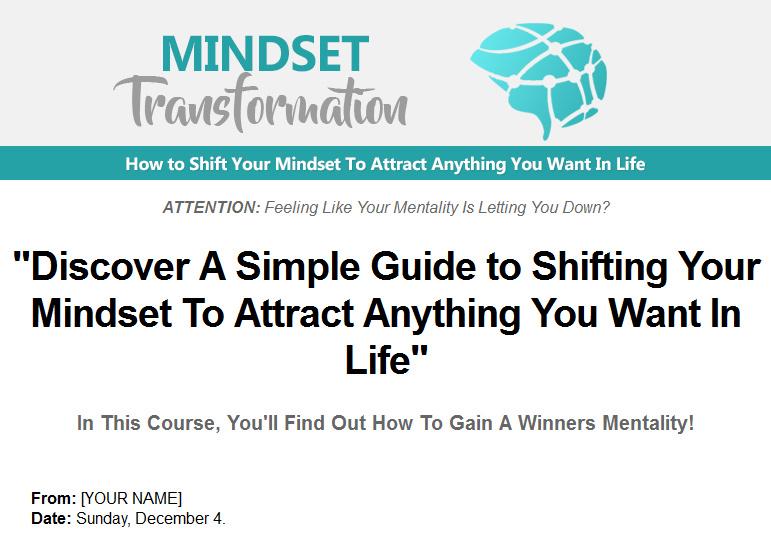Salespage Snapshot:

Table of Contents
Introduction: It All Starts With Your Mind……. 6
Chapter 1: Understanding Your Brain – Some Basic Psychology ….. 10
Chapter 2: The Power of Neurotransmitters . 15
More Neurotransmitters and What They Do… 17
Neurotransmitters for Incredible Abilities …….. 19
Chapter 3: Improving Your Mental Health With the Right Food and
Sleep….. 22
Making Use of Your Biology ……. 24
Combating Stress … 26
How to Upgrade Your Mental Energy … 26
Chapter 4: Mindfulness and CBT for Improving Your Mindset . 28
It’s All About Perception…. 29
The Idea Behind CBT ……. 31
Chapter 5: The New You – Dressing for Success and More ….. 37
What is the Law of Attraction?…. 38
Change from the Outside In…….. 40
Chapter 6: How to Think About Failure and Risk the Healthy Way …. 42
Chapter 7: How to Know What You Want and Go After It 45
Vision, Not Goal…… 46
Chapter 8: 5 Powerful Exercises for Increasing Your Confidence ….. 50
Understand What Confidence Is. 51
Take Challenges….. 52
Visualize Success… 53
Chapter 9: A Simple Workout Anyone Can Stick To…….. 55
The Workout . 56
Chapter 10: How To Maintain a Positive and Happy Mindset … 58
The Gratitude Attitude and Other Techniques 60
Conclusion and Summary 62
Sample Content Preview
Chapter 1: Understanding Your Brain – Some Basic Psychology
What most of us aren’t aware of, is just how much of a slave we typically are to our biology – and especially when it comes to neuroscience. We have the illusion of self-control. That is to say that we feel like we choose what we do and we choose how we feel. If we’re angry, it’s because of some injustice – we’ve thought about the situation and decided that anger is the correct response.
If you’re happy, it’s because all is well with the world and you’re content. We then take all this information and decide what we want to do next and how we’re going to perform at that activity.
But the reality is that we are not in charge of our brains. Rather, our brains are in charge of us. And they’re largely controlled by our bodies and our situations too. Unless we understand the workings of our brain and we’re able to take conscious control over the processes that dictate our moods, our motivations and more, then we are destined to remain at the whim of certain chemicals – and completely oblivious to that fact.
Who Are You?
Okay, so let’s go deep right off the bat. Who are ‘you’? What makes you, you?
The answer is your brain to a large extent. And your brain in turn is made up of billions of neurons – small cells that have tendril-like extensions reaching out and into the different corners of your skull. These neurons can be created, destroyed or changed via our experiences and they represent all kinds of things including memories, sights, smells, thoughts and ‘commands’ to move our body.
When an electrical impulse moves through a neuron, this means it is ‘firing’ and thus we experience whatever correlates with that firing. If you open up someone’s skull and use an electrode to stimulate individual neurons, then one might make someone see a point of red light, one might make someone move their arm and another might make them remember their Mother. These neurons are all interconnected and the more often two neurons fire at once, the more connected they become. Thus, when one neurons fires, it is likely that others around it will fire depending on the strength of the firing (called an ‘action potential), other activity in the area and the strength of the connection. Some ‘clusters’ of neurons form the major brain structures like the occipital lobe, motor cortex or hippocampus which are responsible for particular behaviors. Other neurons reach from one end of the brain all the way to the other!
Already you can see how your brain is not always entirely under your control. If you see something specific, then this will cause certain neurons to fire based on your memories and understanding of that object. But it might also cause surrounding neurons to fire, depending on the associations you’ve formed during that life-time.
And when certain neurons fire, they cause particular emotions. That’s because neurons communicate across synapses – small gaps between the end of one neuron (the axon – which is like a tail) and the dendrites (like arms) of another.
At the end of each axon is the synaptic knob, which is filled with chemicals called neurotransmitters, held inside ‘neuro vesicles’. When the synapse fires, it causes these neurotransmitters to be released and that then alters the behaviour of the transmission and the surrounding cells. Some neuro transmitters are ‘excitatory’ and make other neurons more likely to fire. Others are ‘inhibitory’ and make them less likely to fire – and more suppressed. Others have more complex roles. Some for example will make you more likely to remember something, while others will make you feel happy or sad. This is what controls the way you ‘feel’ about certain experiences. Neurotransmitters are linked closely with hormones too. Some hormones act like neurotransmitters while some neurotransmitters can act like hormones. Essentially, hormones are longer lasting and generally produced in the body, while neurotransmitters have shorter-lasting effects and are produced in the brain. Even hormones produced in the body though are largely triggered by the pituitary gland, which is located in the brain.
See a lion for instance and your brain will sit up and take notice owing to the associations you form with that image. Relevant neurons will fire and because those neurons are coded with danger, they will release a number of neurotransmitters like dopamine and cortisol to increase activity and say that something important is happening. This increased activity causes more of the brain to light up and areas around the hypothalamus will then begin to trigger activity in the pituitary gland, producing adrenocorticotropic hormone. The adrenal gland will also be triggered at this point, releasing the hormone epinephrine, which is essentially a form of adrenaline. This is then what causes changes in the sympathetic nervous system. This triggers physiological changes, including:
• The acceleration of the heart and lungs
• Vasoconstriction (thinning of the blood vessels)
• Dilation of the blood vessels leading to muscles
• Dilation of the pupils
• Inhibition of erection
• Sense of dread/anxiety
• Tunnel vision
• Thickening of the blood to encourage clotting after injury
• Pain reduction
• Contraction of the muscles
• Shaking
• Suppression of digestion and immune function
Essentially, the body now directs all blood, oxygen, nutrients and resources to the muscles and the brain, in order to aid in combat, escape or other physical activity.
All this is involuntary and all of this is controlled entirely by automatic responses throughout your body. And it completely changes the way you now think and the way your body operates. It changes the way people see you and it drastically effects the way you perceive everything that happens subsequently. But it’s not just during times of high stress that you see such uncontrolled changes throughout your body. And there are many complex interactions of chemicals and hormones going on inside your body all the time…
Chapter 2: The Power of Neurotransmitters
In the case described in the last chapter, we saw how releases of dopamine, epinephrine and cortisol among other neurotransmitters could result in the fight or flight response.
But something very similar, albeit much milder also happens when you experience chronic stress. Chronic stress is the kind of stress that ‘doesn’t go away’. This is not a lion but rather an impending deadline at work, wedding planning, property investment, debt, relationship problems… This triggers a very similar stress response, which results in continued changes in your body such as suppressed immune function and digestion, a certain amount of tunnel vision, dread and anxiety etc. So when you’re stressed for long periods, this negatively affects your ability to relax and to enjoy any experiences – but it also impacts negatively on your health in more ways than you might immediately expect.
Dopamine makes us more driven and focussed for instance but only on the thing that is causing the stress. This reduces activity across our brain so that we are more tightly focussed on specific thoughts, emotions, ideas and inputs. That’s why ‘eustress’ can actually be a good thing and make you more likely to revise for an exam. But it has also been shown in studies to make us less creative because we’re less able to let our mind explore different, diverse ideas.
Likewise, stress also makes it hard for us to focus on anything other than that thing that has our attention.
Other Details- 20 Articles (TXT, DOC)
- 1 Ebook (PDF), 63 Pages
- 2 Graphics (JPG, GIF, PNG)
- 1 Salespage (HTML)
- Social Media Images, Email Swipes, Optin Page, Mindmap, Resource Cheat Sheet, Checklist
- Year Released/Circulated: 2016
- File Size: 13,601 KB
License Details:
1. You’re granted master resell rights, resell rights or to resell with personal use rights.
2. You may add this product to your PAID membership site.
3. You may giveaway the product as a bonus when people buy through your affiliate link.
4. You may edit the included sales page and opt-in page.
5. No, you may NOT edit the contents of the eBook(s).
6. No, this product does NOT include private label rights. You are granted Master Resell Rights only.
7. No, you may NOT giveaway the main eBook for free.














